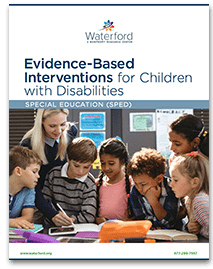In 2004, the federal government passed the Individuals with Disabilities Act (IDEA). This act requires school districts to provide a free education that meets the needs of all children, including those with physical, intellectual, and/or emotional disabilities. When those disabilities threaten the child’s ability to learn, school districts are required to offer free special education (SPED) services.
SPED is not a one-size-fits-all classification. Some children need SPED services because their brains don’t function as quickly or efficiently as their peers’. Others have normal intelligence but struggle with physical, emotional, or specific cognitive deficits. While some disabilities require specific interventions, it’s also true that a handful of evidence-based interventions help nearly all children with disabilities.
In this paper we examine how specific evidence-based interventions can help children with disabilities be more successful in the classroom. Discussed interventions include:
- A simple, predictable classroom environment
- Routines and behavioral accommodations
- Clear and focused instruction
- Differentiated instruction
- Mastering foundational skills
- Assessment, practice, feedback
